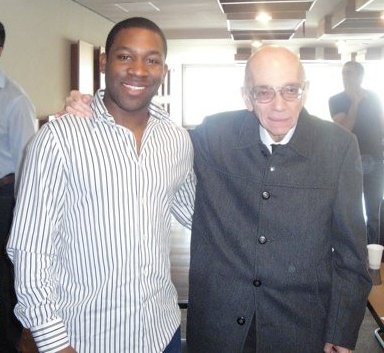Clearly I've spent too much time watching MTV. But that's what it felt like the morning I walked into the New England Conservatory for the first day of the Abreu Fellows Program. My roommates (Abreu Fellows as well) and I (below)

were greeted in the lobby by Jamie Bernstein, daughter of the famous conductor Leonard Bernstein. Turns out Jamie is producing a documentary about El Sistema USA and so a camera crew followed us around for the entire week. Here's the producers, camera crew and Alvaro, one of the fellows:

I thought, good thing I didn't wear my favorite ensemble: baggy jeans and a college sweatshirt.
were greeted in the lobby by Jamie Bernstein, daughter of the famous conductor Leonard Bernstein. Turns out Jamie is producing a documentary about El Sistema USA and so a camera crew followed us around for the entire week. Here's the producers, camera crew and Alvaro, one of the fellows:

I thought, good thing I didn't wear my favorite ensemble: baggy jeans and a college sweatshirt.
This opening week was pretty exciting. Finally meeting everyone involved with the project in person was great. The fact that everyone, from the fellows all the way up to the President of the New England Conservatory is so committed to the cause makes it feel like I've known all these people for much longer than one week.
For myself the highlight of the week was the roundtable discussion with El Sistema graduates. These young musicians grew up in Venezuela participating in El Sistema and are now pursuing post-secondary education in music here in Boston. We bombarded them with questions for almost three hours and they patiently and graciously answered all our queries. A couple of things about the "El Sistema ways" from the roundtable stand out for me.

The first is how often the theme of friendship and bonding came up. The graduates mentioned that they had spent so much time together at El Sistema programs that it made the orchestras play better. Yes, they wanted to go to orchestra because it was fun and their friends were there. But it was also this closeness, this obligation to one another that motivated them to practice, which in turn made the orchestra better. No one wanted to let down their friends. One graduate, when we asked what were some of the elements that had to be part of a successful El Sistema inspired program replied that it was all about friendships. He said put your kids on a bus, drive them around for two hours, bring them back to rehearsal and watch them play better. The notion that the entire orchestra is a family and each member has a responsability to the group is a great way of teaching youngsters how to be functioning members of any society. A great example of orchestra skills translating into real life skills.
Another thing that stood out is a little more technical, but it has to do with how the solo parts are handed out in El Sistema Orchestras. If you watch some videos of the El Sistema orchestras you'll notice how big each instrument section is. I wondered how they divide the parts to decide who plays solos? Well it turns out that everyone gets a chance to play the solo parts in rehearsals, and then whoever plays it best or is most comfortable on it gets to play it in concert. Why is this important? For one, there's no need to explain to a ten year old why he/she isn't playing the solo in the concert because the child has gotten the chance to play it at rehearsal and also can see that someone is doing it better. And second and most important, since every player has had the chance to prepare the solos to play them in rehearsal, everyone feels like an asset. This is key to El Sistema: every child must feel like an asset. As Dr. Jose Antonio Abreu says (but he attributes the quote to Mother Teresa) in his TEDPrize speech:
"The most miserable and tragic thing about poverty is not the lack of bread or roof, but the feeling of being no one".
So, of course the El Sistema orchestras are competitve, but everyone is expected to perform to the best of their abilities, leaving no one to feel like they aren't an essential part of the puzzle. Here I am with with three of the El Sistema graduates Alfredo, Jorge and Mariester.
One of our faculty members Maestro Benjamin Zander is the conductor of the Boston Philharmonic and teaches at the New England Conservatory. He is also a well-known author and speaker. His book The Art of Possibility has sold close to a million copies and is translated into 17 languages. During class last Friday Maestro Zander revealed to us that he's been invited to the White House next Friday where he has been granted a few moments to speak with President Obama privately. I don't know what he will talk to the President about but when and if he tells us, I'll tell you!
This next week's curriculum focuses on early childhood music, strategic planning and monitoring and evaluation. These are all big words to me, as my training is primarily in playing the bassoon. But we have great lecturers coming to speak to us and I look foward to sharing with you how it goes.
And lastly, Jose Antonio Abreu, Gustavo Dudamel and the Simon Bolivar Youth Orchestra will be in Toronto the week of October 26, 2009. Abreu will be receiving one of Canada's most prestigious music prizes, the Glenn Gould prize. I'll blog more about it soon but for now please check out the website for this weeklong event.
